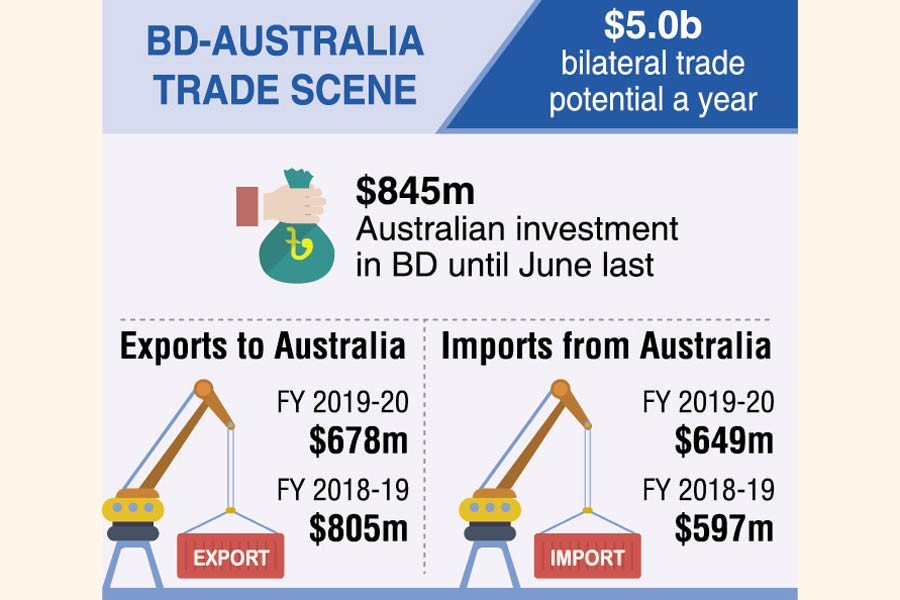
Published :
Updated :

Bangladesh and Australia are set to sign Trade and Investment Framework Agreement (TIFA) aimed at bolstering bilateral trade by way of removing barriers and tapping potential, officials said.
Both the sides have completed the spadework and taken approval for signing the umbrella agreement, possibly in mid-September, they added.
Bangladesh's Commerce Minister Tipu Munshi and Australian Trade Minister Dan Tehan would sign the deal virtually on behalf of their governments respectively.
Under the agreement a working group will be formed which will meet annually discussing issues to facilitate bilateral trade and investment by removing the bottlenecks.
"We have taken required approval according to the rules of business for signing the pact," a senior commerce ministry official told the FE Wednesday.
"Both of us agreed to sign the deal on September 15," he said.
The officials said the aim of deal signing is to boost trade and investment through bilateral cooperation in mutually agreed arenas.
He said sectors like garments and textiles and, manufacturing, information and communications technology, skills development, and education are among the top-listed arenas to get priority in bilateral cooperation.
The official also expects that the deal will pave the way for enhancing Australian investment in Bangladesh. Until June last year, Australian investment in Bangladesh had stood at US$845 million which mainly went for gas and petroleum sectors.
As a least-developed country, Bangladesh enjoys duty-and quota-free market access to Australia. Yet, Bangladesh's annual export to the 14th-largest economy could not cross a billion-dollar mark so far.
In fiscal year 2019-20 Bangladesh exported goods worth $678 million to Australia and $805 million in the previous year. On the other hand, Bangladesh's imports from Australia cost $649 million in FY 2019-20, up from $597 million in the previous fiscal.
Bangladesh's major export items included apparel, textiles, footwear, articles of leather, frozen fish, jute, pharmaceuticals, and ceramics. On the other hand, Bangladesh's top imports from Australia are cotton, edible vegetables, cereals, copper, iron and steel, paper, zinc, and machinery, among others.
In last December, Bangladesh High Commissioner to Australia in a letter to the ministry of commerce said annual bilateral trade may reach $5.0 billion once the TIFA deal is signed and both sides start to extend cooperation.
He further wrote that Australia has been shifting its focus beyond its traditional markets like South Korea, Japan, China, and the Association of Southeast Asian Nations (ASEAN), and concentrating to South Asia to expand trade and investment.
Asked, another senior commerce ministry official said Bangladesh will lose duty-free- and quota-free market access to Australia once the country graduated from the poor- country club in 2026.
After TIFA is struck, Bangladesh will request Australia to extend the duty-and quota-free market-access facility further.
Research Director of the Centre for Policy Dialogue (CPD) Dr Khondaker Golam Moazzem said a number of countries in the Indo-Pacific region are in discussion for signing TIFA.
Such agreements have strategic perspectives, too, which may surpass economic perspectives, he noted.
"The focus of the proposed TIFA with Australia should be exclusively confined to economic issues," he told the FE.
Mr Moazzem suggests that the main objective of the TIFA should be strengthening bilateral ties with Australia for enhancing trade and investment in traditional and non-traditional products/sectors.
Improving Bangladesh's competitiveness to address the post-graduation challenges should also get focus, he says.
Commerce secretary Tapan Kanti Ghosh could not be reached for his comment on the up-and-coming trade deal.
syful-islam@outlook.com


 For all latest news, follow The Financial Express Google News channel.
For all latest news, follow The Financial Express Google News channel.